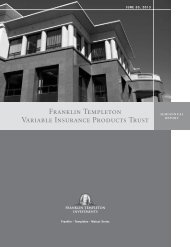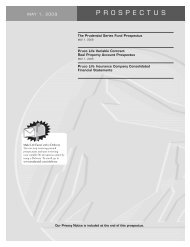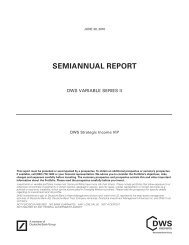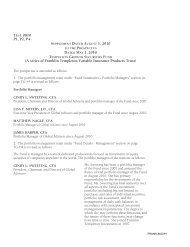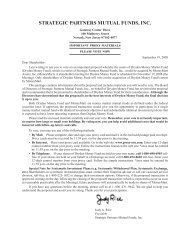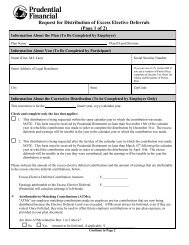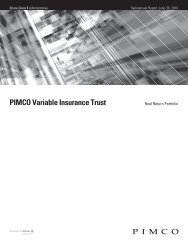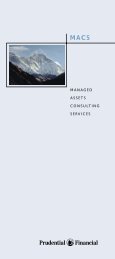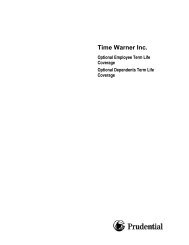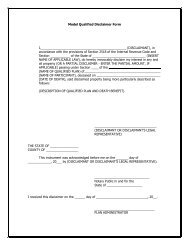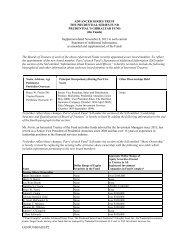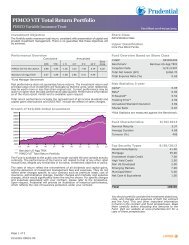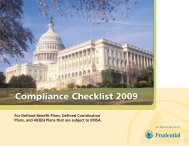Advanced Series Trust AST Academic Strategies Asset ... - Prudential
Advanced Series Trust AST Academic Strategies Asset ... - Prudential
Advanced Series Trust AST Academic Strategies Asset ... - Prudential
You also want an ePaper? Increase the reach of your titles
YUMPU automatically turns print PDFs into web optimized ePapers that Google loves.
markets for the Fund’s foreign securities are open, even though the value of these securities may have changed. Conversely, the Fund<br />
will ordinarily price its shares, and shareholders may purchase and redeem shares, on days that the NYSE is open but foreign<br />
securities markets are closed.<br />
The securities held by each of the Fund’s portfolios are valued based upon market quotations or, if not readily available, at fair value<br />
as determined in good faith under procedures established by the Fund’s Board of <strong>Trust</strong>ees. The Fund may use fair value pricing if it<br />
determines that a market quotation is not reliable based, among other things, on market conditions that occur after the quotation is<br />
derived or after the closing of the primary market on which the security is traded, but before the time that the NAV is determined.<br />
This use of fair value pricing most commonly occurs with securities that are primarily traded outside of the U.S., because such<br />
securities present time-zone arbitrage opportunities when events or conditions affecting the prices of specific securities or the prices<br />
of securities traded in such markets generally occur after the close of the foreign markets but prior to the time that a Portfolio<br />
determines its NAV.<br />
The Fund may also use fair value pricing with respect to U.S. traded securities if, for example, trading in a particular security is halted<br />
and does not resume before a Portfolio calculates its NAV or the exchange on which a security is traded closes early. In addition, fair<br />
value pricing is used for securities where the pricing agent or principal market maker does not provide a valuation or methodology or<br />
provides a valuation or methodology that, in the judgment of the Manager (or Subadviser) does not represent fair value. Different<br />
valuation methods may result in differing values for the same security. The fair value of a portfolio security that a Portfolio uses to<br />
determine its NAV may differ from the security’s published or quoted price. If a Portfolio needs to implement fair value pricing after<br />
the NAV publishing deadline but before shares of the Portfolio are processed, the NAV you receive or pay may differ from the<br />
published NAV price. For purposes of computing the Fund’s NAV, we will value the Fund’s futures contracts 15 minutes after the<br />
close of regular trading on the NYSE. Except when we fair value securities, we normally value each foreign security held by the Fund<br />
as of the close of the security’s primary market.<br />
Fair value pricing procedures are designed to result in prices for a Portfolio’s securities and its NAV that are reasonable in light of the<br />
circumstances which make or have made market quotations unavailable or unreliable, and to reduce arbitrage opportunities<br />
available to short-term traders. There is no assurance, however, that fair value pricing will more accurately reflect the market value of<br />
a security than the market price of such security on that day or that it will prevent dilution of a Portfolio’s NAV by short-term traders.<br />
The NAV for each of the Portfolios other than the Money Market Portfolio is determined by a simple calculation. It’s the total value of<br />
a Portfolio (assets minus liabilities) divided by the total number of shares outstanding. The NAV for the Money Market Portfolio will<br />
ordinarily remain at $1 per share. (The price of each share remains the same but you will have more shares when dividends are<br />
declared.)<br />
To determine a Portfolio’s NAV, its holdings are valued as follows:<br />
Equity Securities for which the primary market is on an exchange (whether domestic or foreign) shall be valued at the last sale price<br />
on such exchange or market on the day of valuation or, if there was no sale on such day, at the mean between the last bid and asked<br />
prices on such day or at the last bid price on such day in the absence of an asked price. Securities included within the NASDAQ<br />
market shall be valued at the NASDAQ official closing price (NOCP) on the day of valuation, or if there was no NOCP issued, at the<br />
last sale price on such day. Securities included within the NASDAQ market for which there is no NOCP and no last sale price on the<br />
day of valuation shall be valued at the mean between the last bid and asked prices on such day or at the last bid price on such day in<br />
the absence of an asked price. Equity securities that are not sold on an exchange or NASDAQ are generally valued by an<br />
independent pricing agent or principal market maker.<br />
A Portfolio may own securities that are primarily listed on foreign exchanges that trade on weekends or other days when the<br />
Portfolios do not price their shares. Therefore, the value of a Portfolio’s assets may change on days when shareholders cannot<br />
purchase or redeem Portfolio shares.<br />
All short-term debt securities held by the Money Market Portfolio are valued at amortized cost. The amortized cost valuation method<br />
is widely used by mutual funds. It means that the security is valued initially at its purchase price and then decreases in value by equal<br />
amounts each day until the security matures. It almost always results in a value that is extremely close to the actual market value. The<br />
Fund’s Board of <strong>Trust</strong>ees has established procedures to monitor whether any material deviation between valuation and market value<br />
occurs and if so, will promptly consider what action, if any, should be taken to prevent unfair results to Contract owners.<br />
For each Portfolio other than the Money Market Portfolio, short-term debt securities, including bonds, notes, debentures and other<br />
debt securities, and money market instruments such as certificates of deposit, commercial paper, bankers’ acceptances and<br />
obligations of domestic and foreign banks, with remaining maturities of more than 60 days, for which market quotations are readily<br />
available, are valued by an independent pricing agent or principal market maker (if available, otherwise a primary market dealer).<br />
310



